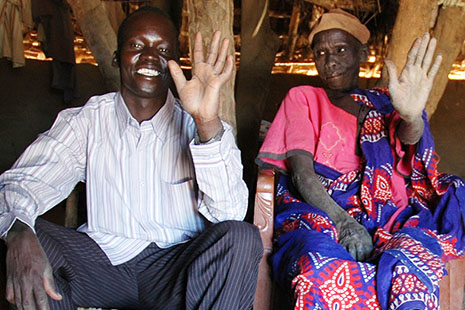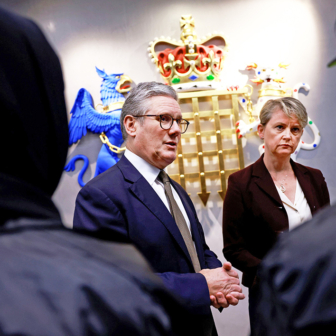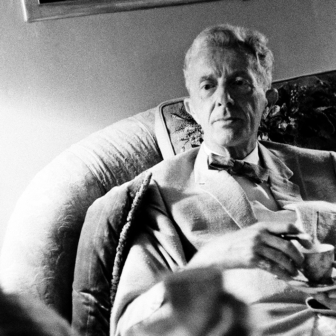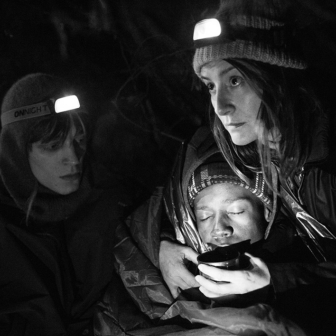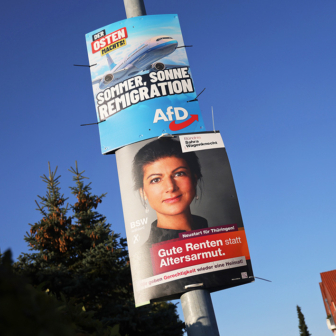Updated, with provisional referendum results, on 25 January
ONE evening earlier this month in Aweil, a dusty former garrison town in southern Sudan, a group of families was unloading their possessions from a freight train – bed frames, mattresses, chairs and cupboards – onto horse-drawn carts. “This railway caused us terrible problems during the war,” said Philip Ngor Bol, a twenty-eight-year-old southerner who was showing me around. “It brought in soldiers from the north. But now it is helping our people come home.”
It was just a few days before the historic referendum on independence for southern Sudan, and hundreds of southerners were arriving in the town each day from the north, to where they’d fled during the devastating 1983–2005 civil war, which caused around two million deaths. The homecoming was predicated on the knowledge that southerners would overwhelmingly vote for secession, splitting the continent’s largest country in two, leaving an Arab-dominated north and a non-Muslim, and more traditionally “African,” south. “Separation is our ultimate goal,” “Vote for freedom,” “Our own land is our own future” and “Become the first citizen in your own country” read the messages on banners strung up in the town. The word “unity” – the other option that would feature on the ballot paper alongside “separation” – appeared nowhere.
I was in southern Sudan to report on the referendum, but I had decided to fly to Aweil, in Northern Bahr el Ghazal state, far from the southern capital Juba, because Bol was there. In the spring of 2008 I had travelled to Kakuma, a refugee camp in northeastern Kenya, for Inside Story. Bol was my guide in the sprawling settlement, and I recounted the story of how he had ended up there in The Mobiliser.
A brief recap: Bol escaped to Kenya in 1996, walking for three months through the bush, barefoot and terrified, after Arab nomads and government soldiers from the north attacked his village. When we met at Kakuma he’d had no word since of his mother, brother and sister; he assumed they were dead, like his father, who’d been killed by northern soldiers when Bol was a small boy.
Still, the independence vote, which was then a little over two years away, was a strong incentive for Bol to return home and start over. And so, in March 2009, he climbed onto the back of a truck leaving Kakuma, with a small bag of clothes, a rolled up mattress, and six treasured books on agriculture, plumbing and theology.
As we travelled around Aweil town by tuk-tuk soon after my arrival, Bol told me what had happened next – a story every bit as extraordinary as his original journey to Kenya as a fourteen-year-old. After the two-day truck journey to Juba, he was given 100 Sudanese pounds (about A$40) by the UN High Commissioner for Refugees – money meant to help him get on his feet – and then put on a plane to Northern Bahr el Ghazal. He managed to persuade a driver working for an aid agency to take him to Warbek, the remote village he fled half a lifetime ago.
Would anyone know who he was after all those years? Would he finally get news of what had happened to his family? “As soon as the car dropped me off in the village market people recognised me,” said Bol. “They were shouting and welcoming me home. It took me some minutes to identify some people – I had to stand aside. Then, somebody said: ‘So will you recognise your mother?’”
A child had already run to tell Bol’s mother, Amel, that her long-l0st son was home. She angrily dismissed the child, assuming it was a joke. It was only when Bol arrived at her hut, overcome with emotion, that she realised it was true. “I hugged her so much,” said Bol. “She said to me, ‘Don’t cry my child. You have found me.’”
Within hours his sister Athoi, now twenty, arrived on the scene, having run from a village fifteen kilometres away after hearing the news. His brother, Bol Bol, was living in another town, far away, but after a month-long search Bol tracked him down and brought him home. After thirteen years, the family was reunited.
Bol agreed to take me to Warbek. At dawn we set out to find a bus heading in the right direction. There were none – many of the buses in Aweil were owned by northerners, who had gone home with their vehicles in the lead-up to the referendum, perhaps fearing their property might be damaged if there were problems with the vote.
We ended up hiring an old minibus driven by a man who was also called Bol, as was his young assistant. As the three Bols and I headed out of town the corrugated dirt road cut through a marshy area with a spectacular area of waterbirds: menacing-looking marabou storks, regal grey-crowned cranes, sacred ibises, egrets and herons.
After a couple of hours, and a final stretch along a path more suited to a motorbike than a car, we arrived at Amel’s home – the home where Bol grew up. It consisted of a small, round thatched hut, raised on stilts to provide protection from wild animals, and a larger hut used mainly to shelter the family’s goats at night.
Amel was not sure how old she was, but I guessed somewhere in her sixties. In common with most southern Sudanese she had endured a very hard, and tragic, life. Since independence in 1956 they had been at war with the north for thirty-seven years. Adding to the problems was a policy of marginalising the south economically; initiated by British colonial administrators, it was pursued after independence, with more malice, by the government in Khartoum.
Warbek had – and still has – no clinic and no clean water. The first five children born to Amel all died before the age of five. So did Bol’s twin brother, Chan. In a soft voice that could not hide her bitterness, Amel told us about the frequent raids by northern Arab nomads, supported by government soldiers, which saw the family lose all the cows and her husband his life.
Then she described the fateful night of the attack that saw Bol disappear for thirteen years. “When we heard the attackers coming we all ran out of the hut but were separated,” she said. “Soldiers caught me. They hit me with the bottom of their guns, on my face, on my chest.” Amel was found barely alive by Athoi and Bol Bol when they returned from their hiding places in the bush. (Bol had kept running through the night, got lost, and decided to carry on south.) Since there were no medicines available Amel's wounds were treated only with hot water. But the worst pain was not physical.
“We looked for Philip, but there was never any good news. So we thought he must have been killed,” she said. “Before he came back I had almost forgotten about him.” Bol Bol, an earnest man of twenty-four, concurred. “Sometimes I forgot about my brother, but I was still praying.”
Now, nearly two years after Bol had returned, the family was praying again – for secession. “The Arabs killed my husband, took our cattle, and caused me to lose my son,” Amel said. “I will only be happy when we are free.”
Like more than a million other southerners, Bol Bol, Athoi and Amel all voted on the first day of this month’s weeklong ballot. But Bol, who was as eager as anyone to see the south separate, was in less of a rush. He had taken a few days off from his job with an American charity that builds churches, and planned to vote later in the week.
In Aweil he and I observed the first day of voting together, starting at a primary school that still had the carcass of an armoured vehicle in its playground – a legacy of the occupation by northern forces. Arriving before the polling centre opened at 8 am, we found a long queue of voters, including elderly men and several young women clutching babies who had arrived there up to six hours earlier.
“A lot of our people have paid a big price and never got to see this day,” said Awan Makoi, a judge in Aweil’s county court, who was one of the first to vote. “So we are blessed to be here. We are lucky.”
I left Aweil the next day, and Bol returned to his village to vote. Across the country, with few exceptions, the poll had gone well, with high turnouts reported. By the time I boarded a plane in Juba for Nairobi, with four days of the referendum still left, a sign had already been pinned to the fence in front of the arrivals area: “Welcome to the 193rd country in the world.”
IN the following days it became clear that the optimism was not misplaced. Before the vote, southerners had feared that the result could be sabotaged by the northern government in two ways: either by ensuring that the minimum 60 per cent turnout would not be reached, or by manipulating the vote tallying process, as occurred in the national election last April.
But provisional figures released by the Southern Sudan Referendum Commission quickly confirmed that nearly 3.8 million people had voted in the poll, representing a 97 per cent turnout. Their choices were even clearer than locals had dared to hope. According to the latest figures published on 22 January, some 3,734,280 people had placed their thumbprints next to the open hand (the symbol for separation) and only 44,830 had chosen unity – 99 per cent versus 1 per cent.
Well over half of the votes for unity were cast by southerners living outside their home region, either in the north of Sudan, where 42 per cent of voters chose unity, or in other countries. But in the south the deep resentment of the northern government was clear. In Unity state, just ninety out of 487,000 voters voted for the country to remain together. In Bol’s home state, which also borders the north, the result was almost as emphatic: 99.94 per cent of ballots cast were for separation.
There are still many challenges before southern Sudan formally achieves independence in July. The border with the north has yet to be demarcated, and the future of Abyei, a disputed area claimed by the north and south, must be settled. And there’s the question of oil. More than 80 per cent of Sudan’s oil lies in south Sudan, but it is landlocked and thus completely reliant on a pipeline that flows through the north. No agreement has yet been reached on how this will work. But it will have to. Bol and his fellow southerners have spoken. There is no going back. •
